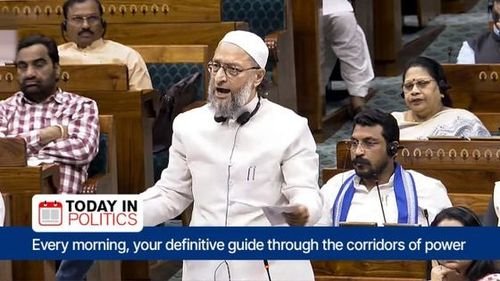Owaisi challenged the Waqf Amendment Bill in the Supreme Court.
All India Majlis-e-Ittihadul Muslimeen (AIMIM) leader Akhanduddin Owaisi has moved the Supreme Court challenging the constitutional validity of the Waqf (Amendment) Bill 2025, which was passed by both Houses of Parliament on April 3, 2025.

The bill aims to reform the administration and management of waqf properties, which is being criticised for curtailing the religious and cultural autonomy of Muslims and enabling arbitrary executive intervention.
Key provisions and criticisms
Inclusion of non-Muslim members: One of the key contents is the inclusion of non-Muslim members in the Waqf Council and state boards. According to Owaisi, the bill stipulates that 11 out of 11 members in the Central Waqf Council can be non-Muslims, and four out of 11 members in state waqf boards must be non-Muslims. They argue that this reduces the self-rights of Muslims over waqf properties.
Definition of waqf by Owaisi Owaisi states that the bill amends the definition of waqf by user, which was upheld by the Supreme Court in the Ayodhya Ram Mandir verdict. He argues that this change limits the ability of the Waqf Tribunal to identify properties based on historical use, a significant concern for the Muslim community. Section 40: The bill removes Section 40, which allows the Waqf Board to take action against encroachment. Owaisi argues that this provision was used only 518 times in the last 30 years, and its removal is unnecessary and detrimental to the protection of waqf properties. Government's stance The Prime Minister Narendra Modi-led government claims that the Waqf (Amendment) Bill 2025 is a "pivotal moment" that will help the marginalised and improve the functioning of waqf properties. The bill, introduced by Minority Affairs Minister Kiren Rijiju, aims to address the limitations of earlier laws, ensure transparency and introduce technology-driven management. The government insists that the bill is not against Muslims but seeks to increase the efficiency and accountability of the Waqf Board.
Protests and Opposition
Congress and AIMIM: Apart from Owaisi, Congress MP Mohammed Jabde and AIMIM have also moved the Supreme Court against the bill, challenging its constitutional validity. They argue that the bill curtails the rights of minorities and discriminates against Muslims.
Muslim Groups: Muslim groups have staged protests against the bill and called it a direct attack on religious freedom and constitutional rights. The All India Muslim Personal Law Board and Jamaat-e-Islami Hind have condemned the bill and accused the government of curtailing the rights of minority communities.
Legal and political implications
Supreme Court challenges: The constitutional validity of the bill is expected to be a crucial test of the legal challenges filed in the Supreme Court by Owaisi and others. The Court will have to examine whether the bill violates the principles of equality and non-discrimination enshrined in the Constitution.
Political implications: The passage of the bill has further polarised the political landscape, with opposition parties and Muslim groups accusing the government of using its majority to curtail the rights of minorities. The dispute is likely to remain a contentious issue in political discourse.
Conclusion
The Waqf (Amendment) Bill 2025 has given rise to significant controversies and legal challenges, with Asaduddin Owaisi and other opposition leaders arguing that it curtails the religious and cultural autonomy of Muslims. The Supreme Court will play a key role in determining the constitutional validity of the bill, and the outcome will have far-reaching implications for the management of waqf properties in India and the rights of minority communities.